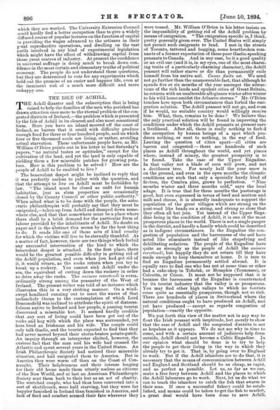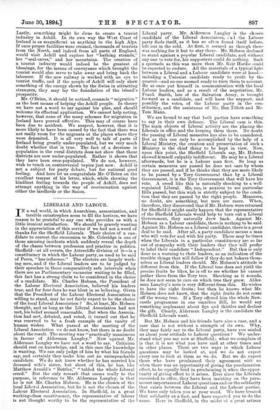THE ISLE OF ACHILL.
The benevolent despot might be inclined to reply that it was perfectly useless to palter with the question, and -that the attempt to live on Achill must be forbidden by -law. " The island must be closed as unfit for human -habitation, just as slum properties are occasionally - closed by the County Council or other public authority." When asked what is to be done with the people, the auto- erotic philanthropist will probably say that they must be emigrated,—taken up from Achill and dumped down some- where else, and that that somewhere must be a place where there shall be a brisk demand for the particular form of labour provided by the inhabitants of Achill. No doubt on paper and in the abstract this seems by far the best thing to do. It reads like one of those acts of kind cruelty for which the victims will live to be eternally thankful. As a matter of fact, however, there are two things which forbid any successful intervention of the kind to which the benevolent despot is attached. In the first place, there would be the greatest possible difficulty in getting rid of the Achill population, and even when you had got rid of it, it would return, as the rooks return when you try to break up a rookery. You cannot sink Achill under the sea, the equivalent of cutting down the rookery in order to drive away the rooks. The animus revertendi is extra- ordinarily strong among the peasantry of the West of Ireland. The present writer was told of an instance which illustrates this in a very striking manner. On a wind- swept headland running out to meet the waves of that melancholy Ocean to the contemplation of which Lord Beaconsfield was inclined to attribute the spirit of distress- fulness native to Ireland and her people, a passing tourist discovered a miserable hut. It seemed hardly credible -that any sort of living could have been got out of the rocks and bog with which the place was surrounded, yet here lived an Irishman and his wife. The couple could ,only talk Gaelic, and the tourist expected to find that they had never moved beyond their storm-beaten potato-patch. An inquiry through an interpreter elicited, however, the curious fact that the man and his wife had crossed the Atlantic and spent several years in the United States. An Irish Philanthropic Society had noticed their miserable situation, and had emigrated them to America. But in America they were worse off than on the Coast of Con- naught. Their helplessness and their intense longing for their old home made them utterly useless as citizens of the New World, and at last an American Philanthropic Society sent them back to their but as an act of charity. The wretched couple, who had thus been converted into a sort of shuttlecock, were half starving, but they were far happier famished in Ireland than famished in America, and lack of food and comfort seemed their fate wherever they were tossed. Mr. William O'Brien in his letter insists on the impossibility of getting rid of the Achill problem by means of emigration. " The emigration specific is, I think, pretty generally given over. The United States will simply not permit such emigrants to land. I met in the streets of Toronto, tattered and begging, some heartbroken rem- nants of a former exportation of these poor Gaelic-speaking peasants to Canada. And in any case, be it a good quality or an evil one (and it is, in my eyes, one of the most charm- ing traits of a particularly charming character), the Achill peasant will rather starve or die than permanently exile himself from his native soil. Causa finites est. We need. not go further than the unanswerable fact, that although he spends five or six months of the year amongst the attrac- tions of the rich lands and opulent cities of Great Britain, he returns with an unalterable allegiance winter after winter to his wild home amidst the Atlantic storms." Mr. O'Brien touches here upon both circumstances that forbid the emi- gration solution. The Achill peasant will not go, and even if he would, no suitable country would willingly receive him. What, then, remains to be done ? We believe that the only practical solution will be found in improving the conditions under which the Achill peasants at present earn a livelihood. After all, there is really nothing to forbid the occupation by human beings of a spot which pro- duces nothing, or next to nothing, in the way of food. Leaving the question of cities apart—all cities are barren and congested — there are hundreds of such places as Achill throughout the world, and yet places where, instead of misery, the greatest prosperity is to be found. Take the case of the Upper Engadine. In that valley not a blade of corn will grow, and not a deciduous tree. For nearly half the year snow is on the ground, and even in the open months the climatic conditions are such that only a specially hardy kind of fir-tree, the Cembra pine, grows to perfection. " Nine months winter and three months cold," says the local adage. It is true that for three months the pasturage is good, but even expressed in terms of beef and mutton and milk and cheese, it is absurdly inadequate to support the population of the great villages which are strung on the post-road like beads on a string, and strung so close that they often all but join. Yet instead of the Upper Enga- dine being in the condition of Achill, it is one of the most prosperous places in the world. There is not a single pauper in the district, and hardly a family which could be described as in indigent circumstances. In the Engadine the con- gestion of population and the barrenness of the soil have acted like stimulants instead of like stupefying and debilitating sedatives. The people of the Engadine have quite as strongly as the people of Achill the animus revertendi, but happily they do not return till they have made enough to keep themselves at home. It is rare to find an Engadine permanently settled abroad. It is equally rare to find one who has not at some time or other had a cake-shop in Tobolsk, or Memphis (Tennessee), or Calcutta, or Cuzco. It must not be supposed that it is because the barrenness of the Engadine is counteracted by its tourist industry that the valley is so prosperous. You may find other high valleys to which no tourists come quite as essentially prosperous, though not so rich. There are hundreds of places in Switzerland where the natural conditions ought to have produced an Achill, and yet have produced except as regards congestion of population—exactly the opposite.
We put forth this view of the matter not in any way to flout the Irish peasant with ineptitude, but merely to show that the case of Achill and the congested districts is not so hopeless as it appears. We do not see why in time to come, and with a certain amount of judicious help from outside, Achill should not become a Celtic Engadine. In our opinion what should be done is to try to help the people to get their living in the way in which they already try to get it. That is, by going over to England to work. But if the Achill islanders are to do that, it is necessary that the means of communication between Achill and England and Scotland should be as cheap, as rapid, and as perfect as possible. Let us, as far as we can, make a free ferry between Achill and the places to which the Achill labourers go to work. Next, let us do what we can to teach the islanders to catch the fish that swarm in their seas. If once a successful fishery could be estab- lished, and means could be taken to get the fish to market, a great deal would have been done to save Achill. Lastly, something might be done to create a tourist industry in Achill. In its own way the West Coast of Ireland is as magnificent as anything in the high Alps. If once proper facilities were created, thousands of tourists from the North, and indeed from all parts of England. would visit Achill and explore her "bathing strands," her "seal-caves," and her mountains. The creation of a tourist industry- would indeed be the greatest of blessings, for the means of conveyance which brought the tourist would also serve to take away and bring back the labourer. If the new railway is worked with an eye to tourist traffic, and if the people of Achill will only show something of the energy shown by the Swiss in attracting strangers, they may lay the foundation of the island's prosperity.
Mr. O'Brien, it should be noticed, counsels " migration" as the best means of helping the Achill people. In theory we have not a word to say against his plan, and should welcome its effectual application. We cannot help noting, however, that none of the many schemes for migration in Ireland have proved effective. This may of course have been due to accident. We suspect, however, that it is more likely to have been caused by the fact that there was not really room for the migrants at the places where they were deposited. It is all very well to talk of parts of Ireland being greatly under-populated, but we very much doubt whether that is true. The fact of a decrease in population in the rural districts does not show that those districts are now under-populated. Rather it shows that they have been over-populated. We do not, however, wish to touch on controversial topics just now. Achill is not a subject for party debate, but for national good feeling. And here let us congratulate Mr. O'Brien on the excellent temper of his letter, which, while showing the kindliest feeling towards the people of Achill, does not attempt anything in the way of recrimination against either the landlords or the Saxon.



















































 Previous page
Previous page